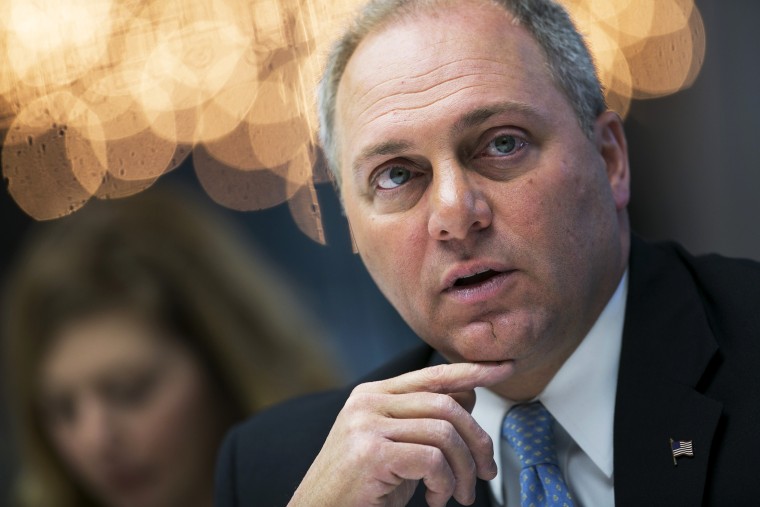Since last summer, the push to restore the Voting Rights Act (VRA) to full strength has been stalled in Congress, felled by a simple lack of interest among Republicans. But an unlikely turn of events could potentially give the effort new momentum.
Last month, news broke that in 2002, Rep. Steve Scalise, the third-ranking House Republican, had spoken to a white supremacist group linked to former Ku Klux Klan leader David Duke. The Louisiana Republican has faced calls—even from some leading conservatives—to step down from his leadership position as majority whip. But he’s been backed by Speaker John Boehner, and looks likely to retain his post.
RELATED: White House weighs in on Steve Scalise controversy
Keeping Scalise on has left the GOP vulnerable to Democratic charges that the party, at the very least, is insensitive to the concerns of racial minorities—a reputation it already enjoys in some quarters. And that’s where those working to strengthen the VRA see an opportunity.
On Tuesday, two top civil rights leaders wrote to Scalise expressing concern about the 2002 speech and other aspects of his record on civil rights issues, and requesting a meeting.
“Specifically,” wrote Wade Henderson of the Leadership Conference on Civil and Human Rights and Marc Morial of the National Urban League, “we wish to discuss your position regarding efforts to repair the Voting Rights Act, the most important civil rights act since the passage of the 15th Amendment to the Constitution, which is celebrating its 50th anniversary this year, and which was gutted by the U.S. Supreme Court’s 5-4 decision in Shelby County v. Holder (2013).”
The message was clear: Supporting a fix to the VRA would be the perfect way for Scalise to mend his tattered reputation with minorities, and neutralize Democratic attacks.
A spokeswoman for Scalise didn’t immediately respond to a request for comment.
RELATED: Steve Scalise: Speaking at supremacist event ‘a mistake I regret’
Nancy Pelosi, too, has brought up the VRA in response to the Scalise story. In a statement issued last week, her spokesman said “actions speak louder than whatever Steve Scalise said to that group in 2002,” adding that “House Republicans have refused to restore the Voting Rights Act or pass comprehensive immigration reform.”
A column that appeared Wednesday in the Capitol Hill newspaper Roll Call also made the case that Scalise and the GOP could benefit by taking up the VRA fix.
“If the majority whip were to announce that securing enactment of such a bill had been added to the roster of top GOP legislative priorities—and that he would personally serve as chief shepherd of the necessary deal-making—that would be a supremely significant step, for reasons both symbolic and substantive,” wrote columnist David Hawkings.
In Shelby County v. Holder, the Supreme Court neutered a key plank of the VRA, which had required certain states and jurisdictions, mostly in the south, to get federal approval before making changes to their voting systems. The court ruled that Congress’s formula to determine which areas the provision applies to is outdated, because the south has made progress on race relations since the 1960s. In the wake of that ruling, several southern states, including Texas, North Carolina, and Mississippi, moved forward with voting restrictions that previously had been, or would likely have been, blocked under the VRA.
Last January, a bipartisan group of lawmakers introduced legislation to update the formula, and civil and voting rights groups launched an aggressive lobbying effort in support of the bill. But so far, Republicans haven’t even held a hearing on the bill. Rep. Bob Goodlatte, who chairs the Judiciary Committee, is said to believe the current VRA remains strong enough to protect voting rights.
Hopes for action took a further hit when Eric Cantor, at the time the number two Republican in the House, shockingly lost his primary for re-election last June. Cantor had expressed openness to the legislation, and civil rights groups saw him as their best chance.
It was Cantor's loss that opened up the spot in Republican leadership which was ultimately filled by Scalise.
